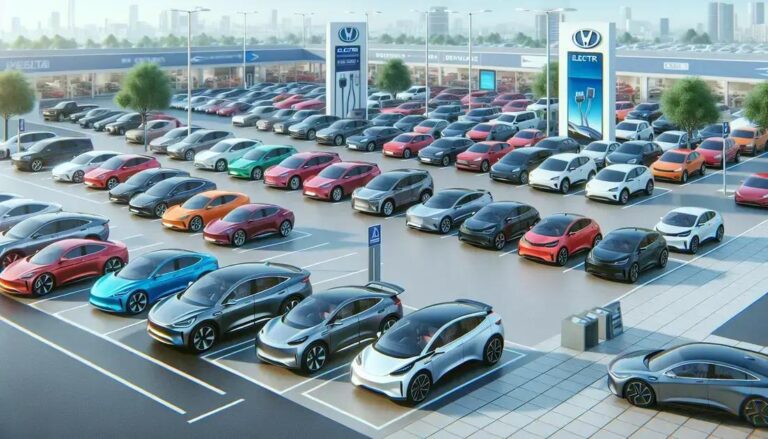Best Electric Cars for Sale in 2025: Models and Prices
Best Electric Cars for Sale in 2025 have become the talk of the town, and for good reason with the world shifting to sustainability.
From sleek sedans to powerful SUVs, the available options are more exciting and diverse than ever before.
Explore the most anticipated models, their pricing, and the perks that make going green even more appealing as you find your perfect EV match.
Top-Selling Electric Car Models In 2025
As the world embraces sustainable technology, electric cars continue to gain popularity. By 2025, several models are set to lead the market with cutting-edge features, affordability, and exceptional performance.
Tesla Model 3
The Tesla Model 3 remains a top contender due to its impressive range, sleek design, and advanced autopilot capabilities. It’s ideal for environmentally-conscious drivers seeking a mix of performance and luxury. With a range of options to personalize the vehicle, including battery choices for increased mileage, it’s no wonder this model is a bestseller.
Nissan Leaf
For those seeking an affordable electric vehicle without compromising on quality, the Nissan Leaf stands out. Known for its reliable performance and efficient energy consumption, the Leaf offers a practical solution for daily commuting. With its easy-to-use technology and comfortable interior, it’s perfect for families and city dwellers alike.
Ford Mustang Mach-E
The Ford Mustang Mach-E adds a sporty twist to the electric vehicle lineup. Combining the iconic Mustang styling with electric power, this model offers a bold driving experience. It’s equipped with state-of-the-art tech, such as an expansive touchscreen interface and driver-assist features, appealing to tech-savvy drivers who love a touch of speed.
These models highlight the blend of innovation and tradition, offering options for different driver needs and preferences. With more brands joining the electric revolution each year, the choices are expanding rapidly, making the transition to electric vehicles both exciting and diverse.
Price Ranges Of Electric Cars For Sale
Understanding the price ranges of electric cars can help potential buyers make informed decisions. As the market expands, prices have become more competitive, catering to various budget segments.
Entry-Level Options
For those on a budget, models like the Nissan Leaf and Hyundai Kona Electric offer entry-level affordability without compromising essential features. Priced between $28,000 and $35,000, these are ideal for urban commuters seeking efficiency and low maintenance costs.
Mid-Range Choices
Electric cars such as the Tesla Model 3 and Ford Mustang Mach-E fall into the mid-range bracket. With prices ranging from $40,000 to $55,000, these vehicles provide a balance of performance, luxury, and advanced technology, appealing to enthusiasts looking for value and style.
Luxury Segment
For luxury seekers, high-end models like the Tesla Model S and Audi e-tron dominate the market. These cars are priced above $75,000, offering unmatched comfort, cutting-edge tech, and superior performance features. They are the epitome of innovation and status for discerning buyers.
With a diverse array of options now available, you can find an electric car that fits your budget and needs, whether you’re hunting for a cost-effective solution or an indulgent ride.
Government Incentives For Electric Cars
Government incentives play a crucial role in making electric cars more accessible to the public. These programs are designed to encourage the adoption of environmentally-friendly vehicles by reducing costs for consumers.
Federal Tax Credits
In the United States, buyers can benefit from federal tax credits when purchasing electric vehicles. This incentive can offer up to $7,500, depending on the vehicle’s battery capacity and the manufacturer’s sales threshold. It’s essential for buyers to check if the model they are interested in still qualifies, as credits phase out after a manufacturer reaches 200,000 sales.
State-Level Rebates
Many states provide additional rebates that can be combined with federal tax credits. For example, California offers the Clean Vehicle Rebate Project, granting up to $2,000 for eligible vehicles. These rebates can vary, so it’s advisable to research specific state programs to maximize savings.
Utility Company Programs
Some utility companies offer incentives such as reduced electricity rates for electric vehicle owners. These programs aim to lower operational costs by providing cheaper off-peak charging rates. Checking with local utility providers can uncover extra savings opportunities.
The combination of these incentives makes switching to electric vehicles more appealing, helping to match or even lower the initial costs compared to traditional vehicles. Staying informed about available programs is key to maximizing the financial benefits of owning an electric car.
Comparison Of Mileage And Charging Speed
When considering electric cars, the mileage and charging speed are crucial factors that affect usability and convenience. Understanding these differences helps in selecting a vehicle that fits your lifestyle.
Mileage Comparison
Range anxiety is a common concern; thus, knowing the mileage of electric vehicles is essential. For instance, the Tesla Model 3 boasts a range of around 350 miles per charge, ideal for long commutes and road trips. In contrast, the Nissan Leaf offers approximately 150 miles, suitable for city driving and short commutes. Similarly, the Chevrolet Bolt EV delivers a solid 259-mile range, balancing affordability with commuter-friendly distance coverage.
Charging Speed
Charging times vary based on battery size and charging infrastructure. The Tesla Model 3 supports Supercharging, adding up to 175 miles in about 15 minutes, perfect for quick top-ups during travel. The Nissan Leaf comes equipped with fast-charging capabilities, restoring up to 80% in 40 minutes at compatible stations. The Hyundai Ioniq Electric can recharge up to 80% in about 54 minutes using a 100kW DC fast charger.
These factors ensure that whether you’re planning a daily drive or an interstate journey, understanding mileage and charging speed helps tailor the electric vehicle choice to your specific needs.
FAQ – Frequently Asked Questions About Electric Cars
What are the top electric car models in 2025?
Some of the top models include the Tesla Model 3, Nissan Leaf, and Ford Mustang Mach-E. These models offer a range of features catered to differing needs and budgets.
How do government incentives help me buy an electric car?
Government incentives, such as federal tax credits and state rebates, lower the initial cost of electric vehicles, making them more affordable.
What should I consider when looking at the price range of electric cars?
Consider the total cost of ownership, including savings from incentives, operating costs, and available options within entry-level, mid-range, and luxury categories.
How does mileage vary among electric cars?
Electric car mileage ranges from about 150 miles on models like the Nissan Leaf to 350 miles for the Tesla Model 3, affecting suitability for different driving needs.
What are the charging speed differences in electric cars?
Charging speeds vary; for example, Tesla’s Supercharger adds 175 miles in about 15 minutes, while others like the Hyundai Ioniq Electric take around 54 minutes for 80% with a fast charger.
Can utility programs affect my charging costs?
Yes, some utility companies offer lower electricity rates for electric vehicle charging during off-peak hours, reducing overall operating costs.






